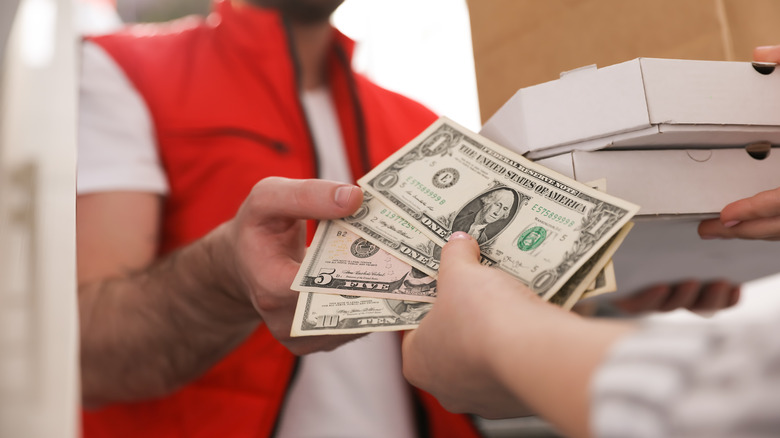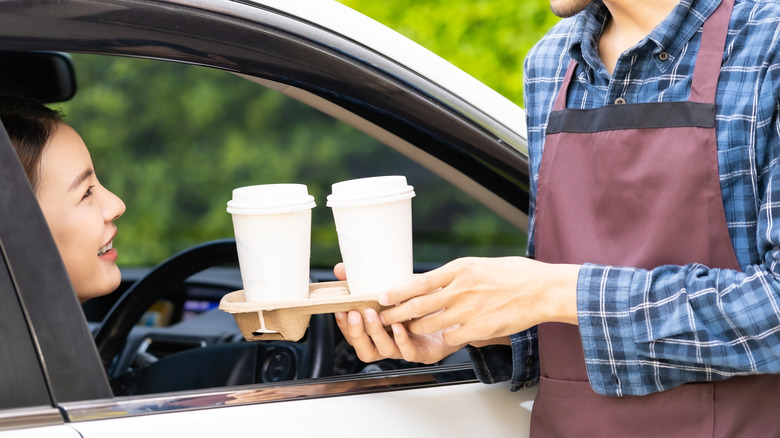Will Tipping At Fast-Food Restaurants Become Standard?
We may receive a commission on purchases made from links.
Tipping for services provided has been a part of American culture for decades. Gratuities date back to the 17th century; in America, the practice was imported from Europe during the 1860s, according to Time. But in some states, Americans weren't impressed with the practice, and several states passed laws preventing tipping, starting with Washington state in 1909, per History Link. Still, Washington's law failed to take into account two very important things. Firstly, there was no mandatory minimum wage, and workers were at the power of their employers when it came to what they could earn. Secondly, there was no easy way to mandate and enforce this particular law.
In Devin Fergus' 2018 book "The Land of the Fee" (via History Link), the author notes that some people also viewed tipping as something that upheld "slavery and racism" in America. As The New York Times explains, many formerly enslaved people found it hard to earn a living, making them easy prey for cheap labor.
"When the practice came to the United States, the newly freed slaves, the black workers, were the equivalent of the proletariat in the feudal system," Saru Jayaraman, an attorney and the director of the Food Labor Research Center at the University of California, Berkeley, told The Washington Post in 2016. "When these states banned tipping, it was because they were trying to discourage whites from tipping instead of actually paying former slaves." But despite its controversial past, tipping remains a go-to policy in most American eateries.
Why would you need to tip at a fast-food restaurant?
With some restaurants solving the tipping problem by including gratuity on their bills, it makes sense that fast-food joints would follow suit to make the work environment more attractive. The hospitality industry is undergoing a major hiring crisis, so the potential for tips could make fast-food jobs more appealing, QSR explains.
Many take-away outlets, such as Starbucks, Panera, and Sonic, have introduced tipping options in their mobile apps and at in-store checkouts. Sonic alone brought in an extra $12 million in tips for its employees in just "a matter of months," QSR noted.
"Tipping on takeout orders is the right thing to do," University of Denver professor H. G. Parsa said to USA Today in September 2021. "Even takeout involves some amount of service, and we should tip those employees." However, the question then becomes whether businesses should rely on the customer to pay the tip or include it in the initial order cost.
Is America headed for a tip-free future?
Several restaurants in the United States have tried doing away with the tipping process — here's what they discovered.
In 2016, Danny Meyer, the founder of Shake Shack and CEO of the Union Square Hospitality Group, had a plan to pay employees a livable wage and to end tipping. This was implemented across all of the dining establishments under his umbrella, Fortune reported at the time. "We're relying on you — the restaurant goer — to pay the living of our servers," he said at South by Southwest that year, via Fortune. But many of the restaurants that initially followed Meyer's lead reverted to a standard tipping model in 2018, Eater reported in 2020. And in 2020, Meyer's restaurants returned to a tip-based model, per The New York Times. Meyer told the outlet that with many customers providing higher tips during the COVID-19 pandemic, he wanted those tips to be available to employees.
Still, some restaurants are still trying to adapt a no-tipping business model. "Before the pandemic, tipping was baked into the industry and we all inherited it. Right now, no one wants to go back and consciously, purposefully inflict its inequities on their staff," chef Amanda Cohen, owner of Dirt Candy in New York City, said to Eater in 2020. Cohen initially did away with tipping in 2015, Eater noted, telling the outlet that her staff would rather make a consistent amount of money over time than rely on the inconsistencies of customer-provided tips.


